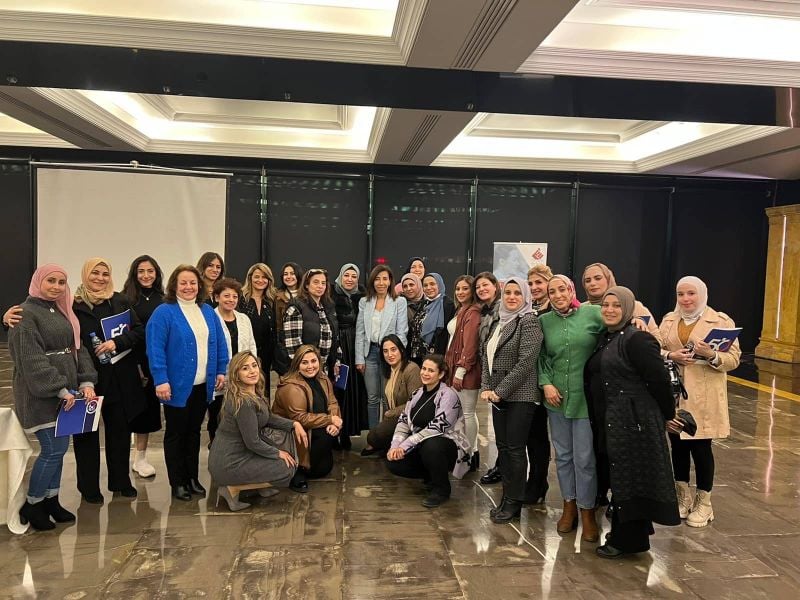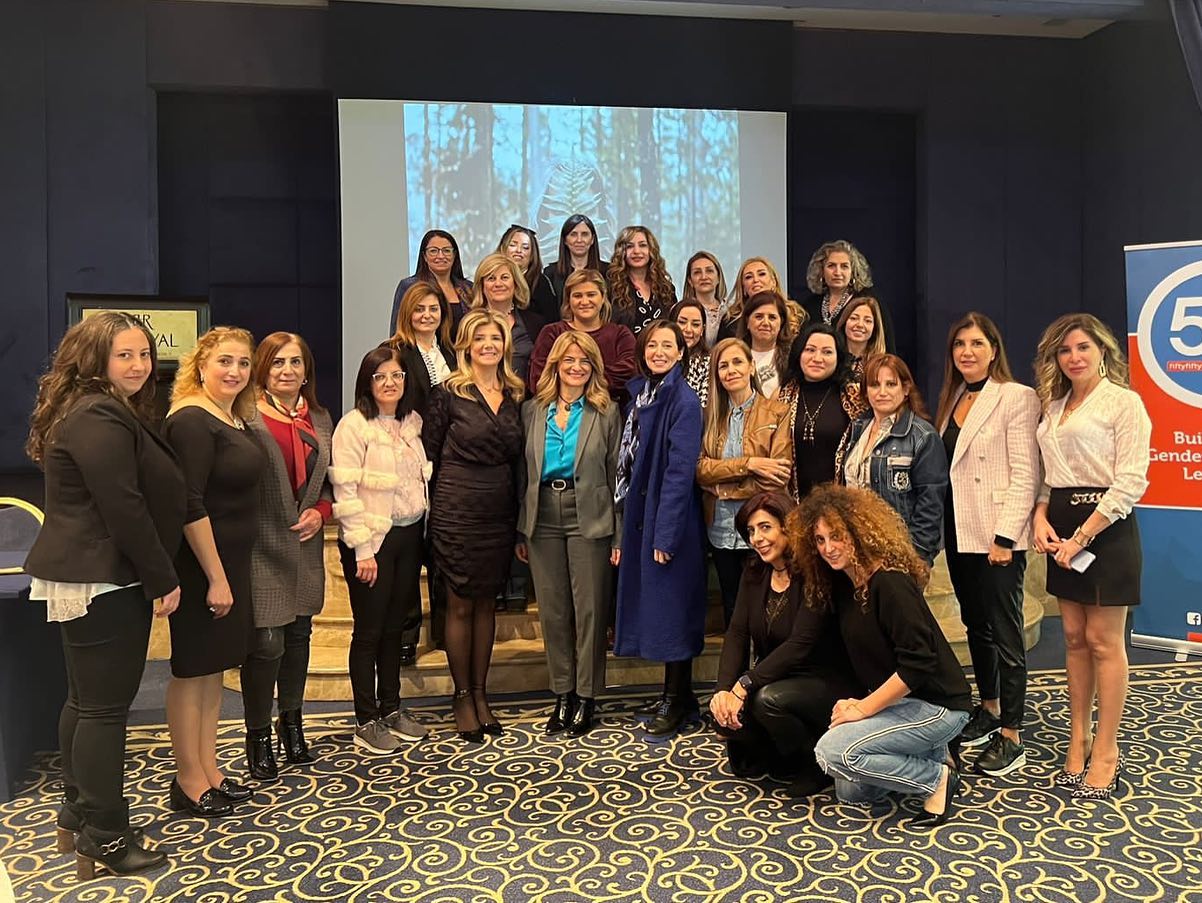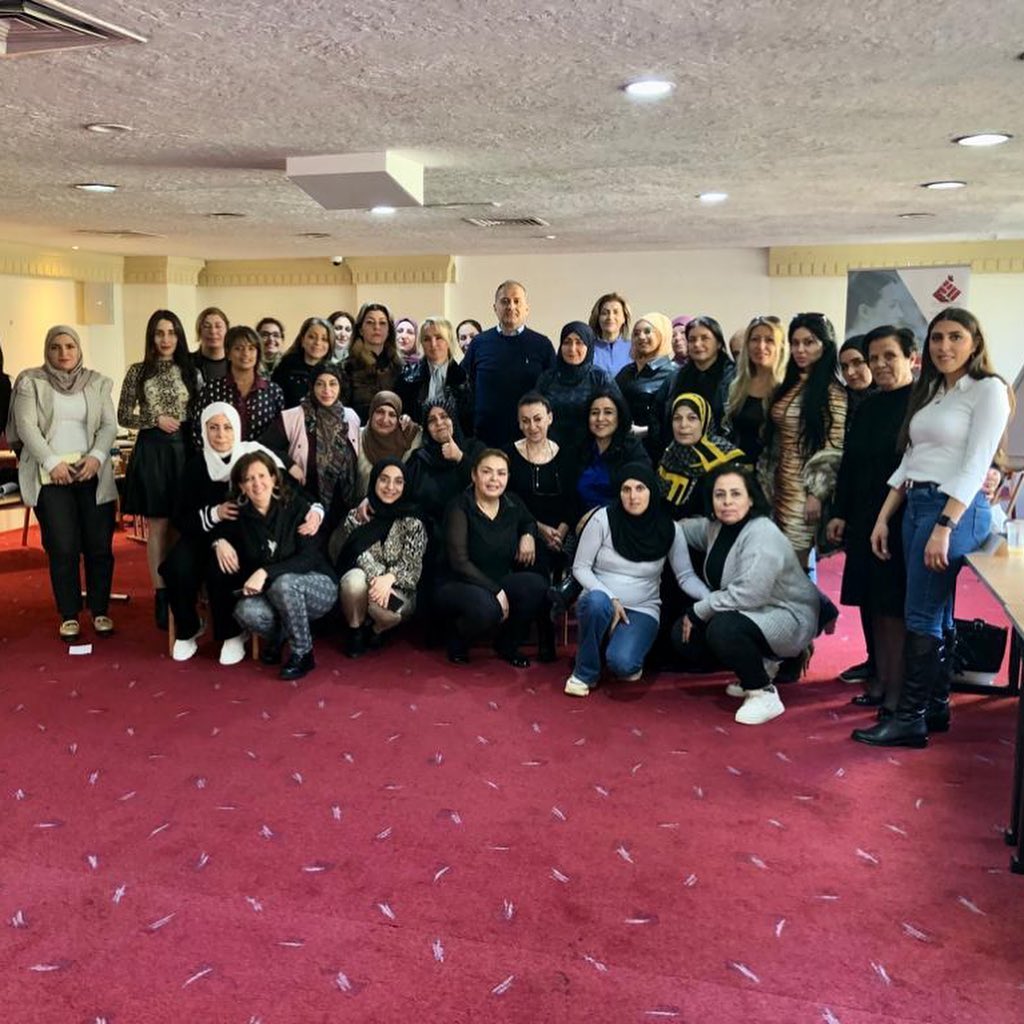
Photo 1: MP Halimé Kaakour (center, in light blue blazer), surrounded by women who have benefited from FiftyFifty training in the north of the country. (Credit: Photo provided by the association)
Women represent only 8 out of 128 members of Lebanon’s Parliament. In the outgoing government, only one of 24 ministers is a woman.
Patriarchal, communal, archaic: Politics in Lebanon is a male affair. Ranked 110 out of 146 countries in women’s political empowerment by the World Economic Forum in 2022, the country has yet to implement a gender quota system.
Since 2018, FiftyFifty has been working to change that. As the next May’s 2023 municipal elections approach, the association is preparing more than 400 women for election day. The initiative launched a call for candidates and organized rallies in different regions throughout the country.
“We encourage [women] to run for election and then prepare them,” says Joëlle Abou Farhat, president of FiftyFifty.
The project received more than 900 applications. 400 women of all political backgrounds were selected on the basis of previous political experience and engagement in their villages.
Assisted by local experts, FiftyFifty helps these women campaign in the field, in the media or via social networks. It also instructs them in public speaking.
“We teach them about establishing a budget, transparency, accountability, Lebanese laws, local development,” says Farhat, who is calling for the implementation of a gender quota in the next election because she says it’s important to ensure that women are represented in municipal government.
Out of 1,050 municipalities, only 10 are run by women, according to the NGO’s figures. Among the 400 selected women, a Zahle-based, Christiane Nahas, director of Maison de la Vierge des Pauvres, provides assistance to the most disadvantaged.
“I participated in FiftyFifty’s training program to learn how the municipal system works, including legislation. It allowed me to gain confidence,” explains Nahas, who plans to run in the next election.
The October Uprisings: A turning point
Joëlle Abou Farhat’s fight to introduce gender quotas began in 2012. She was then the leader of an initiative called Women in Front that campaigned for women's representation in politics.
Trying to convince decision-makers to adopt quotas was a “crazy” idea back then, she says.
“Politicians thought it was strange. Their systematic response was that it was not a priority or even a problem,” Farhat continues.
“We were under the impression that politicians were learning about gender quotas for the first time, when our entire political system is based on confessionalism, another kind of quota,” adds Nada Anid, her partner at the time.
 Photo 2: Around Joelle Abou Farhat (center in turquoise blouse) stand women from Mount Lebanon who participated in the training sessions for the legislative elections. (Credit: Photo provided by the association)
Photo 2: Around Joelle Abou Farhat (center in turquoise blouse) stand women from Mount Lebanon who participated in the training sessions for the legislative elections. (Credit: Photo provided by the association)
They managed to convince more than 113 women to run in the 2018 legislative election and helped 86 of them to be included in the lists.
But in Parliament, change is slow.
In 2018, Parliament included two more women— six female members in total, a far cry from the objective of 30 percent women in decision-making positions set by the Beijing conference of the United Nations.
Two NGOs emerged after the dissolution of Women in Front in 2018: FiftyFifty, led by Farhat, and Madanyat, led by her former partner, Nada Anid.
The October 17, 2019,* uprising represented a turning point in women’s fight for greater political participation.
“Lebanese women took to the streets, like men. They were on the front lines,” says Farhat. “The thawra has been a great support for our work. It has actually changed mentalities.”
Political parties slow to open up to feminist causes
Radical change is long overdue. At the end of the 2022 legislative elections, only 8 women made it to Parliament out of the 118 female candidates included on the lists— 95 percent of whom were supported by FiftyFifty.
Najwa Bassil, a former municipal council member in Byblos, ran against Neemat Frem in the Mount Lebanon Governorate.
“FiftyFifty really encouraged me to run for the election,” says Bassil, who ultimately lost the election. Nonetheless, she said the initiative made it possible to build a network of women, help them develop their skills and share their experiences.
“These types of initiatives allow us to feel supported and move women's issues forward,” Bassil adds. “A man without political experience will be more accepted than a woman. Even if he is incompetent, he will be appointed. It’s a mentality issue,”
When university professor Dima Abou Daya ran for the legislative elections as an independent candidate on the Lebanese Forces list in Zahle (Bekaa), she felt the burden of these deep-seated mentalities. Her family even published a letter disowning her.
“I was the first woman of the Shia faith to run [in the region]. As soon as I decided to run, I faced an avalanche of criticism,” Daya explains. This explains “women’s fears of being rejected by society if they become politically active.”
In Parliament, newly elected women are often targets of sexist behavior from their male colleagues. Like the time Speaker of the House Nabih Berri lashed out at MP Halimé Kaakour by ordering her to sit down and keep quiet.
Berri also reduced MP Paula Yacoubian to her role as wife. “‘Your husband is our friend,’ he reminded me that day,” Yacoubian tells L’Orient-Le Jour. “Parliament is nothing more than a reflection of society. That's why we need initiatives like FiftyFifty that work on women's representation in politics.”
Because female representation is too low to amend laws that discriminate against Lebanese women, particularly when it comes to personal status, “women are still at risk of being deprived of their children if they divorce,” Yacoubian reports.
 Photo 3: Women from the Bekaa who benefited from FiftyFifty's trainings sessions. (Credit: Photo provided by the association)
Photo 3: Women from the Bekaa who benefited from FiftyFifty's trainings sessions. (Credit: Photo provided by the association)
The road to parity in politics is long and riddled with obstacles. However, hope is not lost.
Traditional parties are opening up to women’s demands, encouraged by the two associations advocating for parity. The Progressive Socialist Party (PSP) decided to apply an internal quota of 30 women, reveals Farhat.
“Both FiftyFifty and Madanyat helped to highlight the issue of quotas within our party,” explains Manal Said, president of the Union of Progressive Women inside the PSP. About thirty supporters participated in the training sessions organized by the two associations.
“It taught us how to lead women’s battles and move the women’s representation agenda forward. Now, within the party, we apply the quota of 30 percent women, not only to candidacies but also to electoral lists,” Said announced.
Preferential voting still favors men. This is especially true because, at the national level, legislative proposals advocating gender quotas have never succeeded.
“There’s no point in having women on the lists if they’re not supported,” says Anid.
“Men don’t want to share the power,” concludes Farhat.
*The Oct. 17, 2019, uprising, later called thawra (revolution) broke out in Lebanon after a decision by the Minister of Telecommunications, Mohammad Choucair, to tax the free instant messaging service WhatsApp, amid the collapse of the Lebanese lira against the dollar and severe banking restrictions. While the minister retracted the same day, protests continued across the country for several months before being severely repressed by the government.